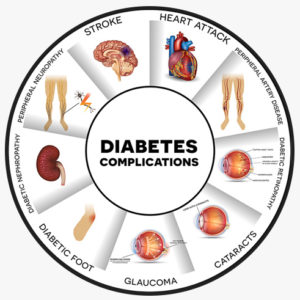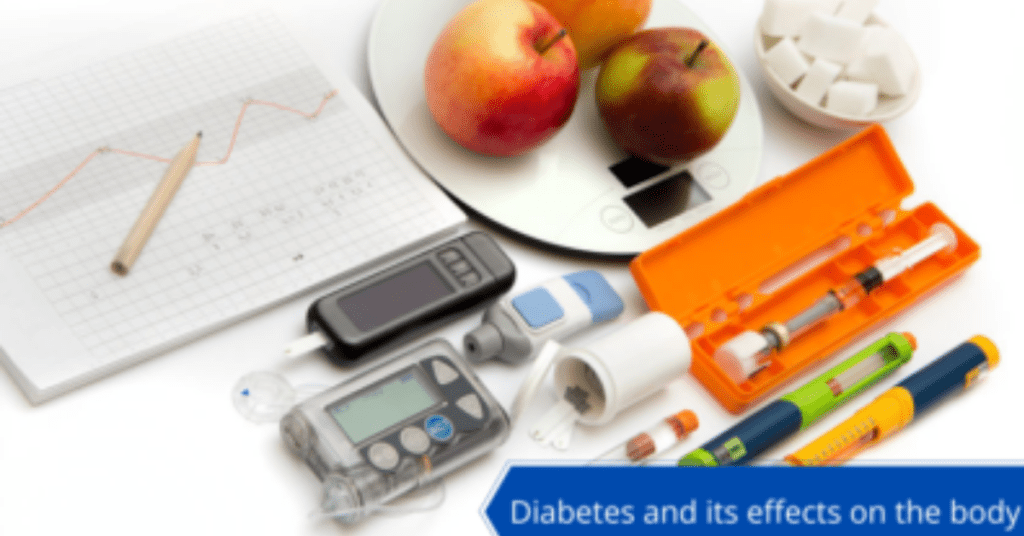Contents
Diabetes
Diabetes is a disease that occurs when your blood sugar level increases. The blood sugar level is the main source of energy that comes from the food that you eat. Insulin is a hormone made by the pancreas and helps glucose from the food you eat to get into your cells. Diabetes is being used as energy. It happens many times that insulin doesn’t use well by your body or your body is unable to make insulin. This will make glucose stays in your blood which is unable to reach your body cells.
However, too much glucose in your blood can cause serious health problems. Although you can manage your diabetes but cannot cure them. You can manage them by following few steps that are recommended by your doctor. These steps will help you in staying healthy.
Types and Symptoms of Diabetes

Type 1
During type 1 diabetes, our body stops producing any insulin. It mainly happens due to the autoimmune response, where our immune system attacks and destroys the pancreas’ insulin-producing cells. The reason why it happens in some people while not in others is still unknown.
However, in type 1 diabetes, our body is not able to produce any insulin at all, due to which the glucose is not able to enter into the cells. It leads to a high glucose level in the blood. Our body tries to release this excess glucose with the help of the kidney.
So here, we can understand that the symptoms of type 1 diabetes include:
- Frequent urination
- Extreme thirst
- Thrust or genital itching
- Slow healing process
- Blurred vision
- Extreme fatigue
- A sudden weight loss
In type 1 diabetes, people must take insulin every day. It will help your body to use the sugar in your body. Other treatments include metformin which is an oral diabetes medication, vaccines or diet, and exercises.
Type 2
Type 2 diabetes is a complex condition as it has more work processes. During this condition, either the body does not produce enough insulin or if it produces, the insulin does not work properly. This condition can also be linked with being overweight, as due to the fat buildup insulin does not work efficiently. However, in some conditions healthy people can also be affected by this condition.
Similar to type 1 diabetes, this condition shows symptoms including:
- Frequent urination
- Excessive thirst
- Thrust or genital itching
- Blurry vision
- Fatigue
- Sudden weight loss
This type of diabetes is usually diagnosed using glycated haemoglobin (A1C) test. It is a blood test that indicates your blood sugar level from the last three months. It can also include random blood sugar tests, fasting blood sugar tests, oral glucose tolerance tests, or screening.
Effects of Diabetes On The Body

There are mainly five side effects of diabetes:
Diabetes Nephropathy
Diabetic nephropathy is a kind of kidney problem brought by diabetes. Diabetes is the main source of kidney disease. Around 1 out of 3 adults with diabetes have kidney disease.
The primary job of the kidneys is to filter wastes and additional water throughout your blood to make urine. Your kidneys likewise help control blood pressure and make hormones that your body needs to remain healthy.
Kidney damages from diabetes can get worse over a long time. However, you can find ways to keep your kidneys healthy and help to slow your kidney damage to prevent or delay kidney failure. Kidney failure implies that your kidneys have lost the greater part of their capacity to work—under 15% of normal kidney function. Though the people with diabetes and kidney infection don’t end up with kidney failure.
Diabetic Neuropathy
It is a type of nerve damage that can happen if you have diabetes. High (glucose) can harm nerves all through your body. However, it often harms nerves in your legs and feet.
However, depending upon the affected nerves, diabetic neuropathy side effects can go from pain to numbness in your legs and feet. It will develop issues with your digestive system, urinary tract, blood vessels, and heart. A few people have gentle symptoms. But, for other people, diabetic neuropathy can be very dangerous, painful, and disabling.
Four types of neuropathy:
- Peripheral neuropathy
This kind of neuropathy may likewise be called distal symmetric peripheral neuropathy. It’s the most well-known kind of diabetic neuropathy. It affects the feet and legs first, then the hands and arms. Major symptoms of this type include numbness, sharp pains, increased sensitivity to touch or foot problems.
- Autonomic neuropathy
It controls your heart, bladder, stomach, sex organs, intestines, or eyes. This can cause bladder problems, decreased sexual response, nausea, vomiting, or loss of appetite.
- Proximal neuropathy
It is also called amyotrophy which often affects nerves in the thighs, hips, buttocks, legs, or abdominal or chest area. This can have symptoms like shrinking of the muscles, serious stomach pain, or pain in the thighs or hips.
- Mononeuropathy
These are of two types as cranial and peripheral. It refers to specific nerve damage. This may lead to weakness, numbness, double vision, or paralysis on one side of the face.
Diabetes Retinopathy
It is one of the diabetes side effects or complications that affects the eyes. This brought causes by harm to the blood vessels of the light-sensitive tissue at the back of the eye (retina).
However, diabetic retinopathy may cause no side effects or just gentle vision issues. In the long run, this can cause blindness. The condition can develop in anyone who has type 1 or type 2 diabetes.
The longer you have diabetes, the less controlled your blood sugar is, and the more likely you are to develop this eye complication. It may include symptoms like blurred vision, fluctuating vision, loss of vision, or floaters.
Diabetes Ketoacidosis
Diabetic ketoacidosis (DKA) is a dangerous consequence of type 1 and, to a lesser extent, type 2 diabetes. When your blood sugar levels are extremely high, acidic molecules called ketones to build up to deadly quantities in your body, causing DKA.
Ketoacidosis is not to be confused with ketosis, which is a healthy state of being in ketosis. Fasting or an extremely low carbohydrate diet, known as a ketogenic diet, can cause ketosis. DKA occurs only when your body does not have enough insulin to metabolize high blood glucose levels.
It’s less prevalent in persons with type 2 diabetes because insulin levels don’t dip as low as they do in type 1 diabetes, but it can happen. Because persons with type 1 diabetes can’t generate their own insulin, DKA could be the earliest sign of the disease.
Foot problem
Diabetic peoples frequently experience foot problems. You may be frightened of losing a toe, foot, or leg to diabetes, or you may know someone who has, but by taking care of your feet every day, you may reduce your risks of developing diabetes-related foot problems. Keeping your blood glucose, often known as blood sugar, under control will help you keep your feet healthy.
You may not notice a stone in your sock or a blister on your foot if you lose feeling in your feet, which can lead to wounds and sores. Cuts and sores can cause you to get infected.
It can also cause a reduction in blood flow in your feet. A sore or infection can be difficult to heal if there isn’t enough blood flowing to your legs and feet. However, a severe infection can sometimes take a long time to recover. The illness can be spread throughout the body.
Prevention of Diabetes Effects On The Body

Diabetes if not controlled then can be the cause of many diseases. It can lead to blindness, kidney failure, heart disease, or other serious conditions.
Though some factors you can’t change like genes, past behaviors, or age. But there are also some actions that you can consider to reduce the complications or risks affecting diabetes.
Diabetes reversal
The loss of body weight can be especially helpful in reversing the course of diabetes. Type 2 can be reversed with time and determination. The results can be highly rewarding, with less fatigue and better overall health.
- Manage stress level
Diabetes and stress appear to be connected in several ways. Stress, in other words, can both cause and be a symptom of diabetes. High levels of life stress have also been related to an increased risk of type 2. It was reviewed that people can develop depression and anxiety when dealing with type 2 diabetes. However, it is important to manage your stress level to lower the risk of diabetes.
- Maintain sleeping routine
One in every two people with type 2 diabetes has sleep issues. As a result, it causes their blood sugar levels to fluctuate and other diabetes-related symptoms. Insomnia, the next day can be caused by high blood sugar (hyperglycemia) or low blood sugar (hypoglycemia) during the night. Feelings of depression or tension about the disease itself, like with many chronic conditions, may keep you awake at night. However, it is recommended to maintain your sleeping schedule properly.
- Implement portion control
People at risk of diabetes need to control their portion of food. Eating too much food at once has been the cause of higher blood sugar and insulin levels. However, it is important to avoid big portions of food especially when you are overweight. This helps in preventing the risks of diabetes.
- Cut down on carbs
Sugary food can develop diabetes. Avoid eating food that is rich in carbs. Because the body’s cells are resistant to insulin. Therefore, sugar levels in the blood remain high. To lower, the pancreas generates extra insulin in an attempt to lower blood sugar to a healthy level.
- Increase fibers intake
Fibers intakes are beneficial for managing a healthy weight. It will help you in keeping your blood sugar level and insulin levels low. Insoluble fibers lead to a reduction in blood sugar levels. However, it helps in decreasing the risks of diabetes.
- Exercise regularly
Performing exercise on regular basis helps in preventing diabetes. Your cells’ insulin sensitivity improves while doing exercise. As a result, when you exercise, you need less insulin to keep your blood sugar levels in control.
- Quits smoking/drinking
Many major health diseases have been due to smoking. This including heart disease, emphysema, and cancer of the lungs, breast, prostate, and digestive tract. Though it is a fact that people gained weight after quitting smoking. However, their risk of diabetes was lower. But if they had continued to smoke after several years then the risk will increase.
A Word From MantraCare
Do you want to get rid of diabetes? Join our online diabetes consultation program and reverse your Diabetes naturally through lifestyle changes such as a Personalized Diet plan, Exercise, dieticians, and health coaches.


